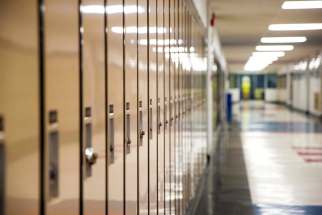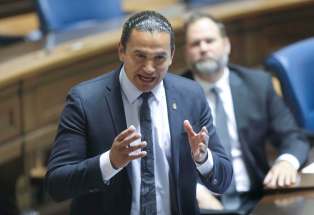Province sending $200 to low-income, disabled Manitobans
Read this article for free:
or
Already have an account? Log in here »
To continue reading, please subscribe:
Monthly Digital Subscription
$0 for the first 4 weeks*
- Enjoy unlimited reading on winnipegfreepress.com
- Read the E-Edition, our digital replica newspaper
- Access News Break, our award-winning app
- Play interactive puzzles
*No charge for 4 weeks then price increases to the regular rate of $19.00 plus GST every four weeks. Offer available to new and qualified returning subscribers only. Cancel any time.
Monthly Digital Subscription
$4.75/week*
- Enjoy unlimited reading on winnipegfreepress.com
- Read the E-Edition, our digital replica newspaper
- Access News Break, our award-winning app
- Play interactive puzzles
*Billed as $19 plus GST every four weeks. Cancel any time.
To continue reading, please subscribe:
Add Free Press access to your Brandon Sun subscription for only an additional
$1 for the first 4 weeks*
*Your next subscription payment will increase by $1.00 and you will be charged $16.99 plus GST for four weeks. After four weeks, your payment will increase to $23.99 plus GST every four weeks.
Read unlimited articles for free today:
or
Already have an account? Log in here »
Hey there, time traveller!
This article was published 26/05/2020 (2026 days ago), so information in it may no longer be current.
Manitoba is sending $200 cheques — accompanied by a letter from Premier Brian Pallister — to 23,000 low-income Manitobans living with disabilities.
The new $4.6-million disability economic support program will go to persons who receive monthly benefits under the disability category of Employment and Income Assistance.
MANITOBA SUPPORTS PAID SICK LEAVE
Premier Brian Pallister says Manitoba is joining with the premiers of British Columbia and Yukon in supporting a federal program for paid sick leave.
“We need a program that protects us against a COVID comeback,” he said Tuesday.
People attending workplaces when they’re sick because they can’t afford to miss a paycheque are “the greatest risk,” Pallister said.
Premier Brian Pallister says Manitoba is joining with the premiers of British Columbia and Yukon in supporting a federal program for paid sick leave.
“We need a program that protects us against a COVID comeback,” he said Tuesday.
People attending workplaces when they’re sick because they can’t afford to miss a paycheque are “the greatest risk,” Pallister said.
“We don’t want people returning to work when they’re sick,” he said, adding the measure will also give the public — and workers — confidence that the businesses and workplaces they visit are safe.
Pallister said Manitoba would be willing to contribute financially to the proposed national program, which he sees as a temporary measure during the pandemic — not a permanent program.
“I’m not interested in using the pandemic to try to create a fundamental change in the national social fabric,” he said. “What I’m trying to do here is make sure we don’t have a COVID comeback.”
Prime Minister Justin Trudeau has said his government will discuss a program with the provinces that would give workers access to 10 days of paid sick leave a year as Canada enters the recovery phase of the pandemic.
The federal NDP has made the paid leave provision one of its conditions for supporting a motion by the minority Liberal government on how Parliament should function during the COVID-19 crisis.
Pallister told a news conference Tuesday the one-time payments will be mailed in early June. The payment will not be considered taxable income and will not affect any other benefits received, he said.
“Manitobans living with disabilities may be facing additional costs in adjusting to the realities of daily life during this public health emergency. For many of them, it is extremely difficult to cover additional costs,” Pallister said.
But as with a recent provincial program that will see $200 cheques go out to all Manitobans over 65 years old, Pallister was criticized for playing politics at the public’s expense.
Those living with disabilities will receive a message from the premier along with their $200 cheque.
Liberal Leader Dougald Lamont said while the payments are needed, the letter is a waste of government money.
“Sending out letters adds cost, and it’s pure self-promotion on the part of the premier,” Lamont said Tuesday. “These are costs that should be paid for by the PC party.”
Asked at a press conference whether he would sign a letter accompanying the cheques, Pallister responded: “Who else would sign it? I think those receiving payment deserve it, and I think the premier of the province owes it to let all the people know that he believes that.”
He said if his intent was to make a political statement, it would have been “smarter” to send out the letters before a general election, not months after one. The Progressive Conservatives won re-election last September.
“I would say it’s a pretty weak case to say we’re doing it for politics when the next election is years away,” the premier told reporters.
Carlos Sosa, a Manitoba disabilities advocate, called the payment a “step in the right direction,” but he said more is needed.
“People with disabilities need sustainable monthly increases,” said Sosa, who works in the community living sector. “This can’t be a one-time amount. It’s time the provincial government made people with disabilities an important part of their agenda.”
“Sending out letters adds cost, and it’s pure self-promotion on the part of the premier.” – Liberal Leader Dougald Lamont
Lamont said neither the Progressive Conservative nor the former NDP government have done enough to help Manitobans on employment and income assistance (EIA), including those with disabilities.
“Providing a one-time $200 payment to people living with disabilities on income assistance is welcome, but totally inadequate,” he said.
“We have said many times that Manitoba’s EIA system is sadistic in the way it treats recipients. It is a system designed to punish people for their poverty, including people with disabilities,” Lamont said.
carol.sanders@freepress.mb.ca
larry.kusch@freepress.mb.ca


Our newsroom depends on a growing audience of readers to power our journalism. If you are not a paid reader, please consider becoming a subscriber.
Our newsroom depends on its audience of readers to power our journalism. Thank you for your support.
History
Updated on Tuesday, May 26, 2020 5:14 PM CDT: Writethru, photos added.
Updated on Wednesday, May 27, 2020 11:05 AM CDT: Adds Larry Kusch to byline.






